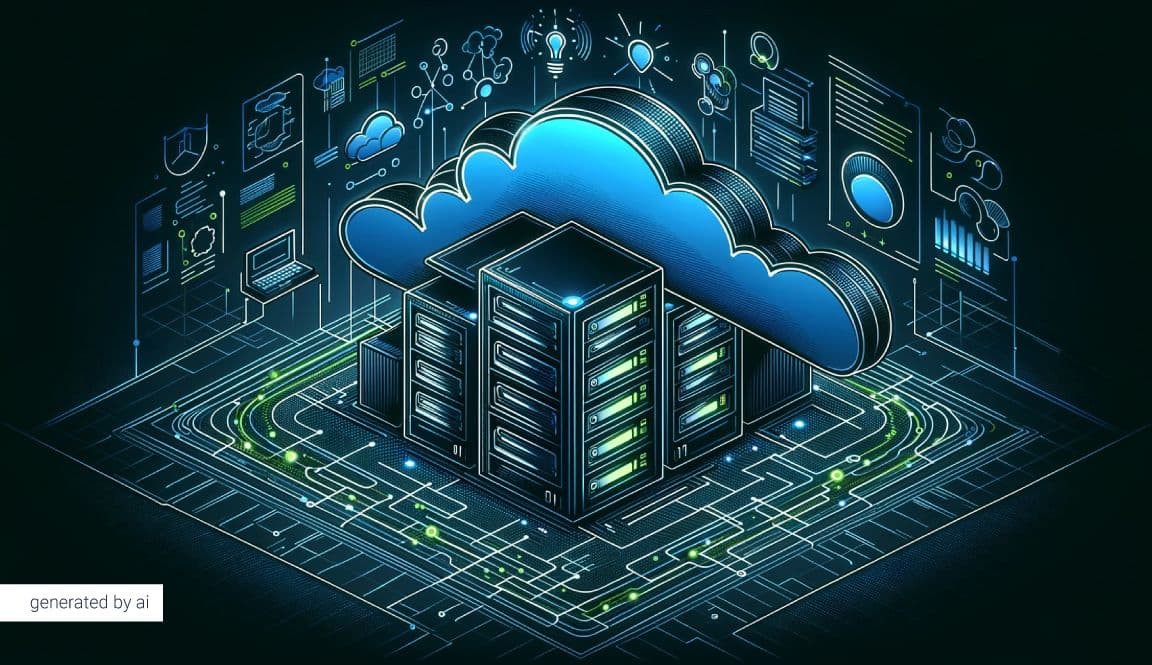
What is a Cloud Server? What are its Advantages?

Cloud servers are virtual infrastructures that perform all the functions of a physical server, processing data, presenting information, and storing it. Unlike traditional servers, these servers are accessible over the internet and can respond to an unlimited number of clients. They are typically managed by a data provider and there are data centers specifically designed for these servers. Users have access permissions for the cloud server they are authorized to access in these data centers. Instead of purchasing a physical server and maintaining it in a specific location, using a cloud server offers many advantages. Therefore, a cloud server that suits the tasks and requirements can provide users with practical and economic benefits. An internet connection and access credentials are sufficient to access a cloud server. Moreover, many users can optimize costs in their operations with the pay-as-you-go method for cloud servers. In the rest of our article, you can find more information about cloud servers and the benefits of using them.
What is a Cloud Server?
Cloud servers are an IT infrastructure that can provide computing resources such as processors, memory, and storage space entirely in a virtual environment, a physical environment, or a combination of both. Based on this information, the most accurate definition of a cloud server is an infrastructure system where computer resources are used in a virtual environment and can be configured according to requirements. Cloud servers possess all the functions of a physical server hosted within a company. They allow users to store and process large amounts of data according to their workflows. When accessing cloud server services using an API, the connected physical devices are not visible. However, the system provided by these devices is typically accessed through a single and convenient interface. Cloud server service providers generally offer monthly payment or pay-as-you-go services. Different service providers may offer plans and shared spaces that vary according to users’ needs.
Cloud servers are a very important service in cloud technology. These servers make a significant contribution to the development and advancement of cloud computing. Cloud computing systems support all types of cloud computing and distribution models, including the three models used worldwide:
- Infrastructure as a Service (IaaS)
- Platform as a Service (PaaS)
- Software as a Service (SaaS)
As a result, they offer users a more advantageous experience compared to a traditional server.
A cloud server operates by virtualizing a physical server to allow access by users in different locations. To perform this function, the hypervisor method is often preferred. This method enables the creation and operation of virtual machines using a hypervisor or virtual machine monitor. After a cloud server functions as a virtual machine, the computing resources of the connected physical server form the cloud server or provide information to the existing cloud server. At the end of these steps, cloud servers can be accessed by users located at any physical location. Access to servers is made via APIs.
Cloud technologies have been a topic of interest for years and are technologies that many users have transitioned to. Today, as with all cloud technologies, cloud servers offer many advantages compared to the limitations of physical servers. For this reason, a large number of companies and individual users switch to various types of cloud servers.
Advantages of Cloud Servers
Cloud servers offer numerous advantages, including accessibility, cost savings, and ease of use. For example, with a cloud server, all users can access the system on a platform or CRM software at any time and from any location using any device they own. Additionally, this allows for the sharing of information with other authorized users located in different parts of the world.
One of the most significant advantages provided by cloud servers is time and cost savings. Easy access to data via an internet connection helps companies or individual users manage their time efficiently in projects. Furthermore, cloud servers can be more cost-effective compared to physical servers due to the pay-as-you-go plans offered by many service providers. The required storage space necessary for serving stakeholders and customers is determined. This way, after acquiring the needed space, there is no need to pay for unused space.
Security is another important consideration when using cloud servers. Without proper security measures, remote access servers can also be accessible to cyber criminals. However, studies show that most data theft occurs within a company's internal data. It is more difficult for thieves to access external networks and encrypted databases. Additionally, implementing security measures such as user-based encryption and access restrictions can be advantageous. For these reasons, keeping some of the data in an external environment outside the company can be beneficial.
Using in-house infrastructure may require more time for maintenance and meeting requirements, making it difficult to focus on core tasks. Cloud server usage facilitates adaptability to changes. You can easily and more cost-effectively meet needs such as additional space and bandwidth. The flexible and practical usage you gain this way is also among the advantages of cloud servers.
Cloud servers enable all stakeholders to access the system at any time and from anywhere. Furthermore, support for access via mobile devices allows everyone involved in projects to be included in the process in real time. Additionally, many cloud-based service providers can offer users an integrated reporting system. This makes it easier to monitor data, generate reports, and focus on goals. In projects with multiple employees, team collaboration can be facilitated more easily compared to other methods. It provides opportunities for real-time access, data processing, and sharing for many users. As a result, team projects can be easier and faster.
Cloud servers can also be more secure than physical servers in various adverse situations and disaster scenarios. The likelihood of data loss is lower in the event of hardware issues or natural disasters that may affect the office. Even if you lose access to your computer, you can regain access to your data using a different computer with an internet connection. Additionally, it is possible to perform system updates, renewals, and backups without the need for manual updates. Moreover, cloud servers are considered environmentally friendly and sustainable because they do not consume extra physical products or hardware.
Types of Cloud Servers
There are four main types of cloud servers that users can choose from according to their needs. These are:
- Public Cloud Server
- Private Cloud Server
- Hybrid Cloud Server
- Dedicated Cloud Server
Among cloud servers, public cloud servers are one of the most common types. The infrastructure resources provided by the service provider are allocated in different parts to various users. Private Cloud Server services offer high levels of security and control. Since there is no sharing, costs are not split as in the case of private cloud servers. Hybrid cloud servers combine the features of both private and public cloud servers. They can share data and applications with both private and public cloud technologies. They are generally preferred for jobs that require scalability. They easily adapt to changing requirements. In the case of Dedicated Cloud Servers, the server resources are not shared with other users, providing a dedicated space for the user. They can be preferred to prevent security and performance issues that may be encountered with public cloud servers. Cloud systems are increasingly preferred due to the advantages they offer. Transitions to cloud servers also play an important role in the use of cloud systems. You can also explore the certified, free Bootcamp on techcareer.net for more information on cloud servers and how they can contribute to your work.



